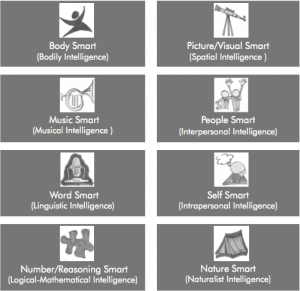How Are You Smart?
Last week, I wrote about How to Transcend All Barriers to Learning. The 100+ year-old story can be summarized in four basic principles:
- Provide Structure.
- Celebrate Originality.
- Build on Aptitudes.
- Make it Relevant.
Today, in celebration of the release of our 2nd Edition of SOAR®, I am pleased to share an excerpt from the book. It is from the very first chapter, where we create a context of “Celebrating Originality” and “Building on Aptitudes.”
In Chapter 1, we introduce Howard Gardner’s Theory of Multiple Intelligences. On the pages following this excerpt, students complete at least two inventories about their own multiple intelligences.
Later in the book, they connect these intelligences to potential careers. This process opens an empowering classroom (and often whole-school) culture of “HOW are you smart?” This is how we begin to build the context of learning that Maria Montessori proved to be so successful.
This process paves the way for students to SOAR®! Enjoy the following excerpt…
How Are You Smart?
Many children and adults go through life feeling dumb, stupid, or simply not smart because of struggles they have had in school. Getting a good education is extremely important, but performance in school is not the only measure of a person’s intelligence. You probably know many adults who did not get good grades in school yet are talented artists, business-people, tradesmen, etc.
Fortunately, many teachers are beginning to realize that intelligence is measured by more than students’ performance on tests and written assignments. Over the last 20 years, Dr. Howard Gardner1, Professor of Education at Harvard University, has been doing research on intelligence. He suggests that there are at least eight different types of human intelligence.
Multiple Intelligences
“Why Are These Intelligences Important?”
Schools traditionally measure students’ abilities in only two intelligences: Number/Reasoning and Word Smarts. While these intelligences are important, they are not the only proof of a person’s ability.
For example, I once had a student who struggled with reading, writing, and math (traditional schoolwork). However, he had an amazing ability to build objects and machines from scrap materials. He drew complex diagrams. He could instantly determine how anything mechanical worked. Many teachers viewed him as a “slow learner,” but he simply struggled in two areas of intelligence (Word Smart and Number/Reasoning Smart). He had the potential to become a successful mechanic or industrial engineer, among other things.
Too many people – students and adults – struggle because they lack confidence in their abilities. They often think, “I may be a good artist, but I’m not smart,” or, “I may be good at repairing things, but I’m not intelligent!” It is unfortunate that a great actor or comedian may not view his talent as a form of intelligence….each and every person is smart! Even a person who has a cognitive disability is likely gifted in some areas (interpersonal intelligence, for example).
Before the rest of this book can be helpful, you must believe in yourself and have confidence that you do have talents. If you have experienced problems in school, you simply have not yet been given the tools to break down the wall. Sections two through five of this book provide those tools. In the meantime, the following two pages encourage you to identify some of your natural strengths and the various ways that you are intelligent. (You can have strengths in many different areas of intelligence.)
Everyone has his or her own special talents…find yours and develop confidence in your own smart self!
The SOAR® Learning & Soft Skills App can be found here!
Sincerely,
Susan
EB 052317
Six Steps to
Conquer the Chaos
Get Our Free Guide & Information on...

"*" indicates required fields
SOAR® in the News
The SOAR® Curriculum
The most critical learning, organizing, and communication skills needed for school. Learn more here.
Who’s Using SOAR®?
SOAR® Guarantee
Click here to learn more.





